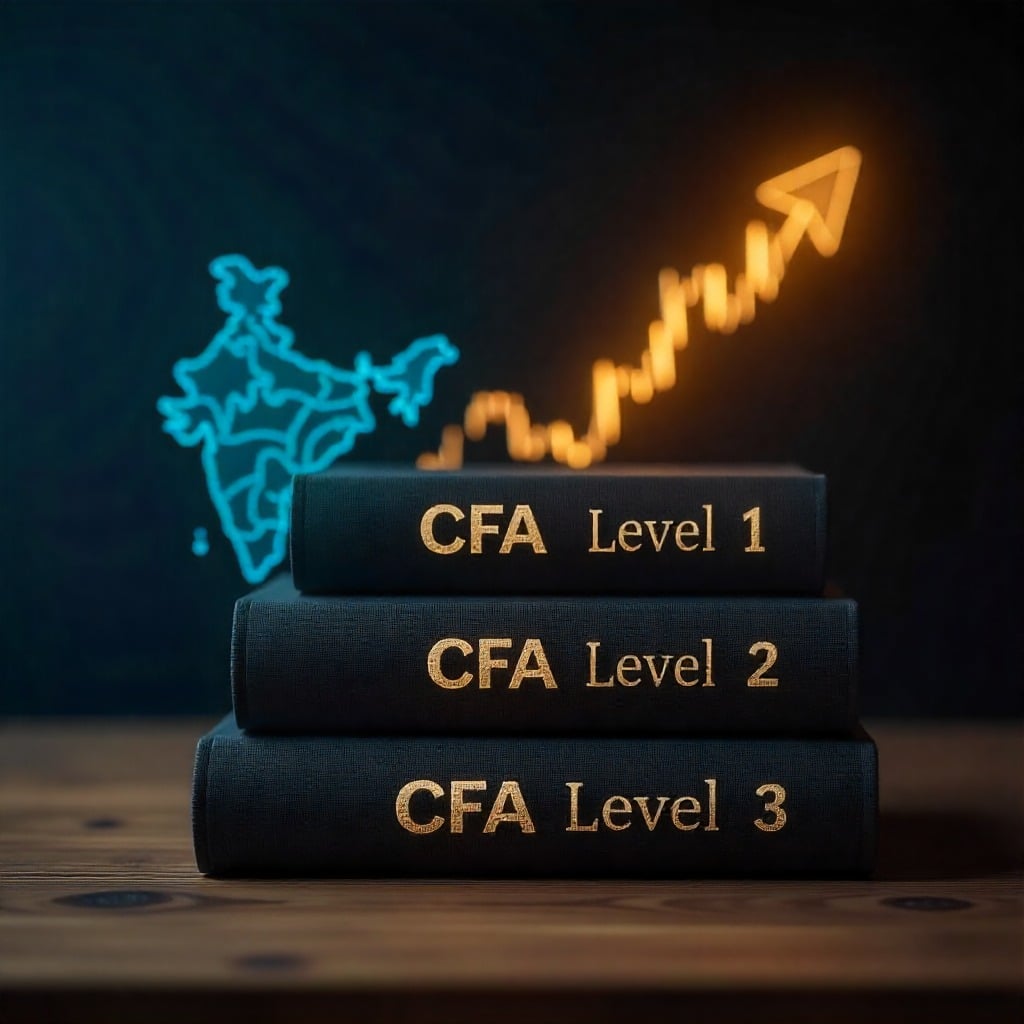What Is CFA and Why Is It So Valued?
The Chartered Financial Analyst (CFA) designation is one of the most prestigious qualifications in the global finance industry. Recognized by top employers across investment banking, equity research, asset management, hedge funds, private equity, corporate finance, and wealth management, the CFA credential is synonymous with deep expertise in investment analysis, corporate finance, and portfolio management. Let’s dive in details about how to become a chartered financial analyst in India.
In simple terms, CFA charter holders are trusted professionals capable of managing large investment portfolios, analyzing complex financial data, and making informed, data-driven decisions in capital markets.
For anyone aspiring to build a career in core finance, the CFA course is a proven pathway—but it requires rigorous preparation, practical skill-building, and a clear plan.
CFA Course Career Opportunities
Completing the CFA program opens doors to high-paying and respected careers in finance, including:
- Investment Banking
- Asset Management
- Equity Research
- Fixed Income and Credit Analysis
- Hedge Funds
- Private Equity
- Corporate Finance
- Wealth and Portfolio Management
Want to Fast-Track Your Career in Core Finance?
Whether you are pursuing the CFA charter, recently graduated or looking to transition into high-growth finance roles like Investment Banking, Equity Research, Asset Management or Private Equity, our Investment Banking Course is your must-have advantage.
The CFA program builds a strong theoretical foundation and answer to how to Become a Chartered Financial Analyst in India, but breaking into these careers requires real, hands-on experience. That’s exactly what we provide at Amquest Education. In this course, you will:
- Write professional research reports like a sell-side or buy-side analyst.
- Build dynamic financial models from scratch for real transactions.
- Create investor-ready pitch books for M&A and fundraising deals.
- Conduct scenario and sensitivity analysis to evaluate projects.
- Leverage AI tools to accelerate market research and insights.
Our Investment Banking course not only equips you with these practical skills but also helps you build a strong portfolio of work to showcase to employers. Plus, you can opt for real-world internship opportunities, working directly with industry experts, giving you the exposure, confidence and network you need to stand out in the job market.
Whether you are a CFA candidate or a graduate from any field with an interest in core finance, this course is the career accelerator that bridges the gap between academic learning and the skills top employers demand.
Seats are limited for the next batch – enroll now to gain the portfolio, skills and experience needed to secure your dream job in Investment Banking or Equity Research or other core finance roles.
Chartered Financial Analyst Course Structure
The Chartered Financial Analyst course is divided into three levels, each testing different aspects of investment knowledge and application.
CFA Level 1: Foundation
- Focus: Core financial concepts, tools, and standards.
- Topics: Ethics, Quantitative Methods, Economics, Financial Reporting, Corporate Issuers, Equity, Fixed Income.
- Exam Pattern: 180 MCQs, divided into two 135-minute sessions (90 questions each).
CFA Level 2: Analysis
- Focus: Application of financial concepts in case-based scenarios.
- Topics: Same as Level I but tested through item sets (mini case studies).
- Exam Pattern: 22 item sets (88 questions total) – 20 scored, 2 unscored – across two 132-minute sessions.
CFA Level 3: Portfolio Management & Wealth Planning
- Focus: Portfolio strategies, wealth management, ethics, and client-focused decision-making.
- Topics: Asset Allocation, Behavioral Finance, Risk Management, Wealth Planning, Institutional vs. Private Portfolio Management, and Ethics.
- Exam Pattern: Mix of essay (constructed response) and item sets, split into two 132-minute sessions (22 total prompts, 20 scored, 2 unscored).
Each level increases in difficulty and practical application, requiring a blend of conceptual clarity, analytical skill, and time management to succeed.
How to Become a Chartered Financial Analyst in India:
Step-by-Step
- Meet the CFA Eligibility Criteria (details below)
- Register for CFA Level 1 on the CFA Institute website
- Join a top CFA coaching program in India (or self-study)
- Pass all three CFA exams (Level 1, 2, and 3)
- Complete 4,000 hours of relevant work experience (before, during, or after exams)
- Apply for CFA membership and charterholder status
- Use the CFA designation and unlock high-paying finance careers
CFA Course Eligibility Criteria in 2025
The requirements have been slightly relaxed by the CFA Institute in recent years.
If you’re planning to start your CFA journey, understanding the CFA Level 1 eligibility criteria and exam requirements is the first step. The CFA Institute allows candidates to register for the Level I exam if they meet at least one of the following conditions:
CFA Level 1 Eligibility for Undergraduate Students
- You can register for the CFA Level 1 exam while pursuing your bachelor’s degree, provided you are within 23 months of graduation on your scheduled exam date.
- The CFA Level 1 exam is offered in four testing windows – February, May, August, and November – allowing flexibility to plan your exam attempt.
CFA Level 1 Exam Requirements for Graduates and Professionals
- If you have already earned a bachelor’s degree (or an equivalent qualification), you are eligible to register for the CFA Level 1 exam anytime.
- Students who pass Level I while still completing their degree can start preparing for CFA Level 2, but they must complete their undergraduate degree before attempting the Level II exam.
Additional CFA Exam Requirements You Must Know
- A valid international passport is mandatory both for exam registration and on exam day.
- The name on your CFA registration must exactly match your passport, or you may be denied entry at the exam center.
- All CFA exams, including Level I, are computer-based and conducted exclusively in English, so candidates must be proficient in English and comfortable with computer-based testing.
Recommended Background:
- B.Com, BBA, MBA, Economics
- Engineers interested in finance
- Working professionals in accounting, finance, consulting
Even if you don’t have a finance degree, you can still pursue the CFA course with dedication and structured coaching.
Why CFA Coaching in India Is Essential
The CFA exam is among the toughest finance certifications worldwide, with average pass rates around 35–45%. Self-study alone can be challenging, which is why quality CFA coaching can dramatically improve your chances of passing. Still thinking how to Become a Chartered Financial Analyst!
What to Look for in a CFA Coaching Program:
- Faculty with CFA credentials and industry experience
- Updated CFA Institute curriculum and question banks
- Mock exams, practice tests, and doubt-solving sessions
- Case-study-based teaching to link theory with real-world finance
- Mentorship and placement support for career growth
Join the best CFA Coaching with Amquest Education – led by industry experts, integrated with placement support, and tailored for India’s finance ecosystem. Amquest Education is the pathway to get CFA Charter and the answer to how to Become a Chartered Financial Analyst.
Why Amquest Education Offers the Best CFA Classes in India (2025)
At Amquest Education, we combine CFA Institute curriculum mastery with practical finance skills and career support, ensuring you not only clear the exams but also land top finance roles.
Why Choose Amquest Education?
- Live interactive sessions with CFA Charterholders.
- Real-time doubt-solving, crash courses, and revision sessions.
- AI-powered exam analytics to identify your strengths and weaknesses.
- Internship and placement assistance for real-world exposure.
- Flexible schedules for students and working professionals.
Learn more about Amquest Education’s CFA course and start your CFA journey with India’s trusted finance training institute.
Career Opportunities and Salaries After CFA
Completing the CFA program can unlock some of the most respected and high-paying careers in finance.
| Role | Average Annual Salary (2025) |
|---|---|
| Equity Research Analyst | ₹8–14 LPA |
| Portfolio Manager | ₹12–20 LPA |
| Investment Banker | ₹10–25 LPA |
| Risk Analyst / Risk Manager | ₹9–18 LPA |
| Private Equity Associate | ₹12–25 LPA |
| Corporate Finance Specialist | ₹8–15 LPA |
Note: Salaries vary based on experience, city, and firm. Practical exposure (through internships, modeling projects and certifications) can significantly boost your pay scale.
Over time, CFAs earn significantly more due to the prestige, but you must also ensure that you simultaneously build practical, hands-on knowledge.
Type CFA Exam Questions and Pattern
Understanding the type of CFA exam questions is crucial for success:
CFA Exam Structure Overview
Level I – Foundation Stage
The CFA® Level I exam is split into two sessions, each lasting 2 hours and 15 minutes (135 minutes). Every session features 90 multiple-choice questions, giving candidates roughly 1.5 minutes (90 seconds) per question.
Level II – Advanced Application
At Level II, the test is divided into two 2-hour and 12-minute sessions (132 minutes each). Each session contains 11 case-study-based “item sets,” with four multiple-choice questions per set. In total, there are 22 item sets (88 questions) across the day, where 20 contribute to your score and 2 are experimental sets for research purposes.
Level III – Mastery Stage
The final CFA level combines multiple-choice and essay-style (constructed response) questions. The exam is again split into two 132-minute sessions, featuring a mix of 11 item sets and 11 essay questions in total. Of these, 20 are graded, while 2 are unscored trial questions. Each session includes a balanced combination of both question formats to test analytical depth and communication skills.
All levels test ethics, analytical thinking and application of finance principles. Time management and conceptual clarity are critical to pass any level of the CFA exam.
What is the full form of CFA?
CFA stands for Chartered Financial Analyst, a globally respected finance designation offered by the CFA Institute. It certifies expertise in investment analysis, portfolio management, and financial decision-making.
What is the CFA meaning in finance?
In finance, CFA stands for a professional designation that signifies advanced expertise in investment management, risk analysis, valuation and adherence to ethical standards in financial markets. Since careers in this field often demand valuation work, developing practical skills in building valuation models is essential.
What is the CFA course eligibility in India?
If you’re planning to take the CFA exam, it’s important to understand the CFA Level 1 eligibility criteria and exam requirements before registering. The CFA Institute allows you to register for the CFA Level 1 exam if you meet one of the following conditions:
CFA Level 1 Eligibility for Students – You can apply while pursuing your bachelor’s degree, provided you are within 23 months of graduation on your scheduled exam date. The exam is offered in February, May, August, and November, giving you flexibility to choose your test window.
CFA Level 1 Eligibility for Graduates and Professionals – Anyone with a bachelor’s degree (or equivalent qualification) can register at any time. If you pass CFA Level 1 while still in college, you may start preparing for Level 2, but you must complete your degree before sitting for the Level 2 exam.
Additional CFA Exam Requirements –
-A valid international passport is required for registration and for identity verification on exam day.
-The name on your CFA registration must exactly match your passport; otherwise, you may be denied entry at the test center.
-All CFA exams, including Level 1, are computer-based and conducted in English, so you need English proficiency and basic computer literacy to succeed.
By meeting these CFA Level 1 eligibility standards, you can successfully register and start your CFA journey.
What are the CFA Levels and what do they test?
There are three CFA levels:
Level 1: Tests financial concepts and tools
Level 2: Tests analytical skills and real-world application
Level 3: Test strategy, application, and client-focused decision-making.
At CFA Level III, candidates choose one specialized pathway from three options: Portfolio Management, Private Markets, or Private Wealth. These pathways represent different areas of focus within the broader field of investment management and allow candidates to tailor their studies to their specific career aspirations.
What types of CFA exam questions should I prepare for?
The CFA exam includes:
Level I – Foundation:
Two sessions of 135 minutes each, with 90 multiple-choice questions per session (about 90 seconds per question).
Level II – Application:
Two 132-minute sessions, each with 11 case-based item sets (4 MCQs each). A total of 22 sets (88 questions), where 20 count toward your score and 2 are unscored trials.
Level III – Mastery:
Two 132-minute sessions combining 11 item sets and 11 essay-style questions. 20 are graded, with 2 unscored trial questions.
Across all levels, the CFA exam tests ethics, analytical ability, and practical finance skills, with time management and strong conceptual understanding key to success.
Practicing these question types is essential for passing.
Which institute offers the best CFA coaching in India?
Amquest Education is one of the top-rated providers of CFA coaching in India, offering expert faculty, live classes, mock exams, doubt-solving sessions, crash-course and AI-enabled performance tracking for all three levels.
How long does it take to become a CFA?
It usually takes 2 to 3 years to complete all three levels of the CFA course, assuming one level is passed per attempt. Some professionals take longer depending on work and study commitments.
Final Thoughts: Your CFA Journey Starts Now
The journey to becoming a Chartered Financial Analyst (CFA) is challenging but highly rewarding. With the right CFA classes in India, expert mentorship and consistent study habits, along with gaining practical experience in building financial models, writing research reports, creating pitch books, conducting scenario and sensitivity analyses and leveraging AI tools for market research, will help you join the elite league of globally recognized finance professionals.
Whether you are a recent graduate or a working finance professional, now is the ideal time to invest in your career growth. Let Amquest Education guide you through this transformative journey. Now you know everything in detail about how to Become a Chartered Financial Analyst.
Seats for our next CFA coaching and Investment Banking batches are limited. Start your CFA journey today with Amquest Education—India’s trusted institute for aspiring finance leaders.







